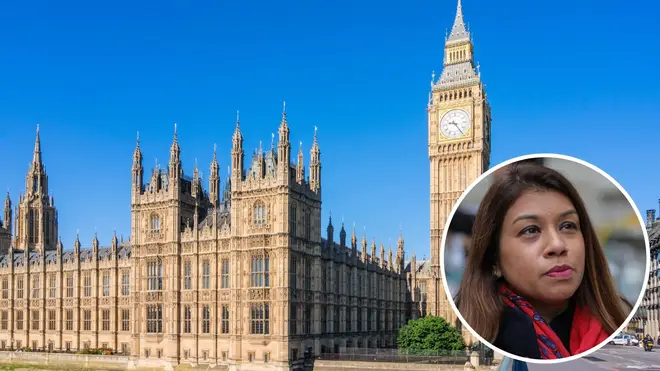
Nick Ferrari 7am - 10am
23 April 2022, 22:04 | Updated: 24 April 2022, 22:58

Labour MP Tulip Siddiq has insisted there should be a "zero tolerance" approach to MPs' behaviour after reports three cabinet ministers and two shadow cabinet ministers are facing allegations of sexual misconduct.
The members of Boris Johnson and Sir Keir Starmer's teams have been referred to the new parliamentary watchdog set up amid the #MeToo scandal, The Sunday Times reported.
Ms Siddiq told LBC's Swarbrick on Sunday she was concerned that "more and more MPs are being accused of misconduct", adding "I very much worry about the reputation of Parliament and Westminster."
"For me it's not about who it is from which party, if it's someone from my party and they've engaged in sexual misconduct there should be a zero tolerance approach and I think all MPs should be saying that," she said.
In total 70 separate complaints involving 56 MPs have been reported to the Independent Complaints and Grievance Scheme (ICGS) since it was established in 2018.
READ MORE: Rees-Mogg criticised over 'demeaning' notes left for WFH civil servants
READ MORE: Nadine Dorries slams critics for mocking her dyslexia after TikTok gaffe
The Sunday Times said allegations range from making sexually inappropriate comments to more serious wrongdoing, including an allegation that an MP bribed a member of staff in return for sexual favours.
It comes after Conservative MP Imran Ahmad Khan quit last week after he was convicted of sexually assaulting a teenage boy before he was elected.
Another Tory MP, David Warburton, had the whip suspended earlier this month amid allegations of sexual harassment.
Two women had reportedly made formal complaints about Mr Warburton's behaviour to the ICGS, and a third woman had also made allegations about his conduct.
A union representing senior civil servants said more needs to be done to stamp out harassment in Parliament.
Dave Penman, general secretary of the FDA union, said: "While some of the procedures for raising complaints have improved, the fundamental balance of power between MPs and the staff they employ has not.
"Where that exists it will inevitably be exploited, either by those who do not have the skills to manage staff effectively, or those with more malevolent intent.
"It can come as no surprise, therefore, that if the circumstances that allowed bullying and harassment to flourish have not changed fundamentally.
"Parliamentary authorities need to address the fundamental causes of bullying and harassment, rather than simply rely on an enforcement mechanism that only protects those who feel able to raise complaints."

'It's such a disgraceful story, I'm astonished they even printed it.'
Mr Penman said that meant "looking again at the employment relationship between MPs and the staff", with a view to reforming the model of having 650 individual employers.
He said authorities should instead consider establishing a new employment model that "will help protect staff whilst maintaining the level of service that MPs need to support their vital work".
A government spokesperson said: "We take all allegations of this nature incredibly seriously and would encourage anyone with any allegations to come forward to the relevant authorities."
Downing Street and Labour said they were unable to comment.
The ICGS was set up as an independent process with cross-party backing after the so-called Pestminster scandal, which shone a spotlight on sexual harassment in the rooms and corridors of power.
It operates a hotline allowing those who work in Westminster to ring in to lodge a complaint or seek advice.
It exists to allow workers to report experiences of bullying, harassment and sexual misconduct. They can also report having been witness to, or aware of, such behaviour.
In a statement on its website, Jo Willows, director of the ICGS, said the service is an "important step forward in tackling inappropriate behaviour in our workplace".
Allegations made to the ICGS are private and confidential and political parties are not given information about who has been reported.